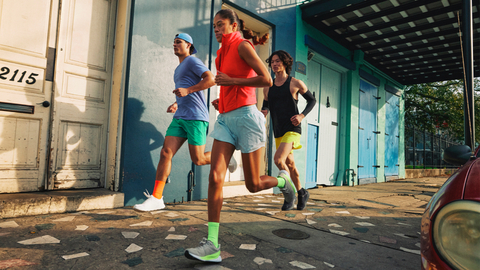lululemon’s Third Annual Global Wellbeing Report Reveals the “Wellbeing Dilemma”: Though People Are Increasingly Prioritizing It, It’s Not Improving
- More than 67% of people prioritize wellbeing
- 43% agree global unity on climate change makes them hopeful for the future
- lululemon aims to provide access to wellbeing tools to 10 million people globally
- One in three respondents feel their wellbeing is lower than ever before
- Institutions are not doing enough to help with societal wellbeing
- Climate anxiety heightens anxiety for 41%
Insights
Analyzing...
More than
yet

lululemon releases third annual Global Wellbeing Report. (Photo: Business Wire)
“Insights such as these help us to have a real conversation around the state of wellbeing so that we can better understand how to support people and communities in their efforts to be well," said Susan Gelinas, Chief People & Culture Officer, lululemon. “Advancing wellbeing is not a solitary effort, it is a collective undertaking that requires commitment and compassion as we build a path towards positive change."
lululemon is committed to advocating for and advancing greater possibility and wellbeing for all. The Global Wellbeing Report provides a glimpse into the world’s state of holistic wellbeing, across physical, mental and social elements, allowing the brand to assess the barriers and challenges to wellbeing and identify actionable solutions through advocacy efforts and key initiatives.
Why this is happening
While many pandemic era challenges are behind us, there has not been a post-pandemic morale boost, with
-
30% don’t have the time to think about their wellbeing. -
51% are deprioritizing their wellbeing due to cost concerns. -
39% feel the pressure to conform to societal norms negatively impacts their mental wellbeing.
How it manifests
The report uncovered that everyone is struggling, one way or another, with certain groups feeling the impact of low wellbeing more acutely, creating a ripple effect of impact to both the individual and society:
-
58% cannot be the best version of themselves when their wellbeing is low. - On average people missed five days of work and seven days of school in the past 12 months due to low wellbeing.
-
Mental health taboo is a significantly higher barrier for Gen Z compared to older generations with
60% of Gen Z wishing they could express how they actually feel, instead of always pretending to be fine (vs.55% Gen X,41% Boomer+). -
48% of individuals identifying as men feel society has made it more difficult for men to speak up about their mental health than women. -
69% of those with disabilities feel they cannot live their life to the fullest when their wellbeing is low (vs.51% without disabilities).
A path to progress
However, there are signs of progress, as people take control of their wellbeing with small but powerful steps and call on institutions to help enact change:
-
77% of people say they have a significant responsibility in taking wellbeing into their own hands. -
74% of people feel that institutions are not doing enough to help with societal wellbeing, and more than half of respondents prefer to support brands and businesses that work hard to improve societal wellbeing. -
While climate anxiety is high (
41% say it heightens their anxiety), it is also a unifier with43% agreeing global unity on climate change makes them hopeful for the future.
The report uncovers steps everyone can take to improve their wellbeing, learning from those with higher wellbeing:
- Work out / exercise with other people when possible. Half of those with high wellbeing are working out with other people more now than pre-pandemic (vs. only a quarter of those with low wellbeing).
-
Prioritize spending time with your loved ones.
41% of those with high wellbeing are prioritizing spending time with loved ones more now than pre-pandemic (vs. only29% of those with low wellbeing). - Work to express all your emotions, not just the positive. More than half of those with high wellbeing are actively trying to make sure they can express their full range of emotions, not just ones linked to happiness (vs. only 4 in 10 of those with low wellbeing).
“Far too many people, one in three, feel their wellbeing is lower than ever before,” said Daniel H. Gillison, Jr., CEO of the National Alliance on Mental Illness (NAMI) and lululemon Mental Wellbeing Global Advisory Board Member. "That's why NAMI is proud to work with lululemon and lead the conversation to help anyone who is struggling reach compassionate, equitable support and resources."
As part of its Impact Agenda, lululemon and its Centre for Social Impact have made significant progress toward its goal of providing access to wellbeing tools to more than 10 million people globally (5 million reached since 2021) and investing at least USD
This World Mental Health Day, October 10, lululemon will be hosting a series of activities around the globe supporting physical, mental and social wellbeing. From community sweat sessions to interactive pop-ups, a list of activations and how to participate by region can be found here: https://corporate.lululemon.com/media/our-stories/2023/lululemon-to-host-world-mental-health-day-activities-around-the-globe
To view the lululemon 2023 Global Wellbeing Report, please visit: https://corporate.lululemon.com/~/media/Files/L/Lululemon/investors/annual-reports/lululemon-2023-global-wellbeing-report.pdf
About the Global Wellbeing Report
lululemon began publishing its annual Global Wellbeing Report in 2021 to help guide its ongoing work in the wellbeing space in support of its purpose of elevating human potential by helping people feel their best. The 14-market study2 benchmarks the state of wellbeing with the Global Wellbeing Report and explores the drivers and barriers to being well mentally, physically and socially. The findings from the report also guide lululemon as it determines where and how to support further research and advocacy efforts on its path to achieving its Be Well goals outlined in its Impact Agenda. To learn more about how lululemon is advancing its Impact Agenda goals, and to download a copy of our recently released Impact Report, please visit: https://corporate.lululemon.com/~/media/Files/L/Lululemon/our-impact/reporting-and-disclosure/2022-lululemon-impact-report.pdf
1The wellbeing index is based on the three wellbeing dimensions: Physical Wellbeing, Mental Wellbeing and Social Wellbeing. After indexing the ratings on each dimension to 100, overall wellbeing is calculated as the average of the three wellbeing dimensions. This average is then rebased to create an index out of 100, calculated at the respondent level.
2Research was fielded May 1, 2023, to June 6, 2023, and included 14,000 general population adults globally (1,000 within each of the 14 markets:
About lululemon
lululemon (NASDAQ: LULU) is a technical athletic apparel, footwear and accessories company for yoga, running, training, and most other activities, creating transformational products and experiences that build meaningful connections, unlocking greater possibility and wellbeing for all. Setting the bar in innovation of fabrics and functional designs, lululemon works with yogis and athletes in local communities around the world for continuous research and product feedback. For more information, visit lululemon.com.
View source version on businesswire.com: https://www.businesswire.com/news/home/20230921454822/en/
lululemon
Lauren Corsaro
lcorsaro@lululemon.com
Edelman
Renee Mailhiot
Renee.Mailhiot@edelman.com
Source: lululemon athletica inc.







